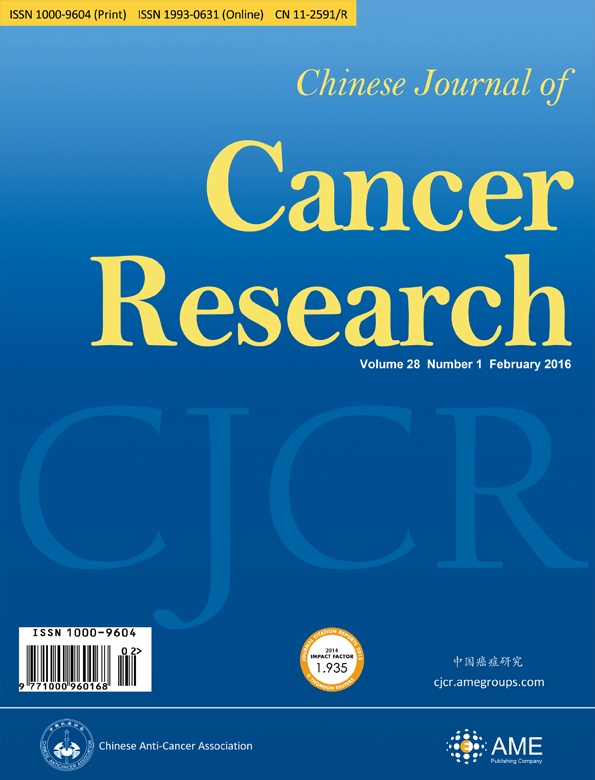曲妥珠单抗联合辅助化疗治疗人表皮生长因子受体2(HER2)阳性的早期癌症:中国患者的现实世界回顾性研究
IF 7
2区 医学
Q1 ONCOLOGY
引用次数: 7
摘要
目的评价曲妥珠单抗辅助治疗早期人表皮生长因子2(HER2)阳性癌症的长期有效性和安全性。方法回顾性观察分析中国医学科学院2000~2012年间HER2阳性乳腺癌症患者的病历资料。纳入接受单独辅助化疗或辅助化疗后/联合曲妥珠单抗的患者。Kaplan-Meier方法用于估计无病生存期(DFS)和总生存期(OS)。使用Cox回归模型计算危险比(HR)和95%置信区间(95%CI)。结果在分析的1348例患者中,909例接受单独化疗,439例接受化疗加曲妥珠单抗。单独化疗组的3年、5年和10年DFS发生率分别为83.70%、76.38%和68.94%,化疗加曲妥珠单抗组的DFS发生率为90.21%、86.19%和83.45%。单化疗组的3年、5年和10年OS发生率分别为96.10%、91.40%和81.88%,化疗加曲妥珠单抗组的OS发生率为98.17%、94.91%和90.01%。经协变量调整后,化疗加曲妥珠单抗组的疾病复发和死亡风险显著低于单独化疗组(DFS:HR=0.50,95%CI,0.37−0.68;P<0.001;OS:HR=0.53,95%CI;0.34−0.81;P=0.004)。在439名接受曲妥珠单抗治疗的患者中,多变量分析表明,淋巴结阳性、T分期较高和激素受体阴性状态与疾病复发的较高风险显著相关,而淋巴结阳性和激素受体阳性状态与死亡的较高风险显着相关。3/4级不良事件(发生率≥1%)在接受曲妥珠单抗治疗的患者中更常见(54.44%对15.73%)。淋巴结阳性、激素受体阴性和较高的T分期可能与较高的复发风险有关,需要对有这些因素的患者进行有效治疗。本文章由计算机程序翻译,如有差异,请以英文原文为准。
Trastuzumab plus adjuvant chemotherapy for human epidermal growth factor receptor 2 (HER2)-positive early-stage breast cancer: A real-world retrospective study in Chinese patients
Objective To assess the long-term effectiveness and safety of trastuzumab in adjuvant therapy for Chinese patients with early-stage human epidermal growth factor 2 (HER2)-positive breast cancer in a real-world setting. Methods This retrospective observational study analyzed the medical records of HER2-positive breast cancer patients between 2000 and 2012 at the Chinese Academy of Medical Sciences. Patients who received adjuvant chemotherapy alone or adjuvant chemotherapy followed by/combined with trastuzumab were included. The Kaplan-Meier method was used to estimate disease-free survival (DFS) and overall survival (OS). Hazard ratios (HR) and 95% confidence intervals (95% CI) were calculated using the Cox regression model. Results Of the 1,348 patients analyzed, 909 received chemotherapy alone and 439 received chemotherapy plus trastuzumab. The 3-year, 5-year and 10-year DFS rates were 83.70%, 76.38% and 68.94%, respectively, in the chemotherapy-alone cohort, and 90.21%, 86.19% and 83.45% in the chemotherapy plus trastuzumab cohort. The 3-year, 5-year and 10-year OS rates were 96.10%, 91.40% and 81.88% in the chemotherapy-alone cohort, and 98.17%, 94.91% and 90.01% in the chemotherapy plus trastuzumab cohort. The chemotherapy plus trastuzumab group had a significantly lower risk of disease recurrence and death than the chemotherapy-alone group (DFS: HR=0.50, 95% CI, 0.37−0.68; P<0.001; OS: HR=0.53, 95% CI, 0.34−0.81; P=0.004) after adjusting for covariates. In the 439 patients treated with trastuzumab, multivariate analysis suggested that lymph node positivity, higher T stages, and hormone receptor-negative status were significantly associated with higher risks of disease recurrence, and lymph node positivity and hormone receptor-negative status were significantly associated with higher risks of death. Grade 3/4 adverse events (incidence ≥1%) were more common in patients receiving trastuzumab (54.44%vs. 15.73%). Conclusions Early-stage HER2-positive breast cancer patients treated with trastuzumab plus adjuvant chemotherapy have a significant survival benefit compared with chemotherapy-alone in real-world settings. Lymph node positivity, hormone receptor-negative status, and higher T stages may be associated with higher risks of recurrence, and effective therapy for patients with these factors is required.
求助全文
通过发布文献求助,成功后即可免费获取论文全文。
去求助
来源期刊
自引率
9.80%
发文量
1726
审稿时长
4.5 months
期刊介绍:
Chinese Journal of Cancer Research (CJCR; Print ISSN: 1000-9604; Online ISSN:1993-0631) is published by AME Publishing Company in association with Chinese Anti-Cancer Association.It was launched in March 1995 as a quarterly publication and is now published bi-monthly since February 2013.
CJCR is published bi-monthly in English, and is an international journal devoted to the life sciences and medical sciences. It publishes peer-reviewed original articles of basic investigations and clinical observations, reviews and brief communications providing a forum for the recent experimental and clinical advances in cancer research. This journal is indexed in Science Citation Index Expanded (SCIE), PubMed/PubMed Central (PMC), Scopus, SciSearch, Chemistry Abstracts (CA), the Excerpta Medica/EMBASE, Chinainfo, CNKI, CSCI, etc.

 求助内容:
求助内容: 应助结果提醒方式:
应助结果提醒方式:


